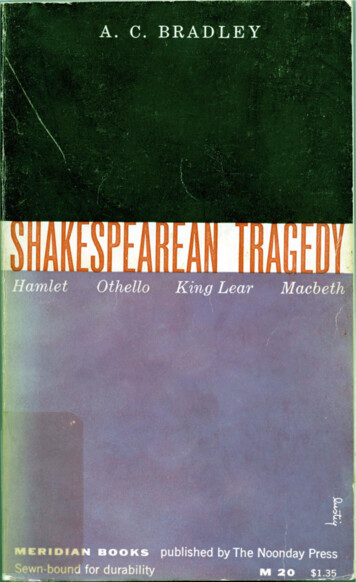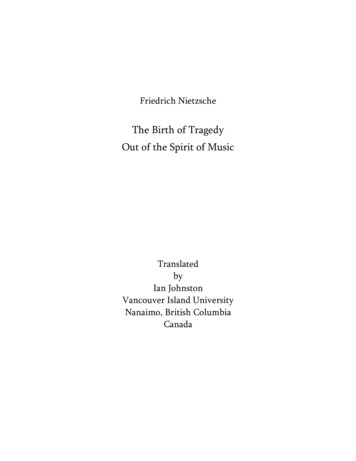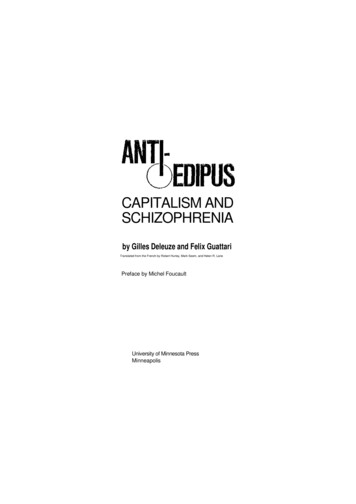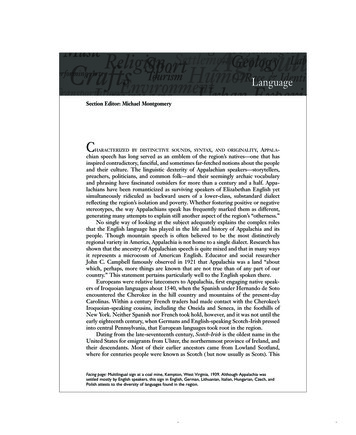
Transcription
SHAK ESPEA REAN TRAG EDYH amlet/v'OthellofltKing Lear-z,9!3,& 7Th;;LMacbethA. C. BRADLEY M E RI DI AN B O O KS\N ew Y ork I.Q55
Content IntroductionuLECTURE IThe Substance of Shaltespearean Tragedy15LECTURE IIConstruction in Shaltespeare's Tragedies41LECTURE IIIShaltespeare's Tragic Period-Hamlet71LECTURE IVHamlet109LECTURE VOthello144LECTURE VIOthello16g9
10ContentsLECTURE VIIKing Lear1 97LECTURE VIIIKing Lear224LECTURE IXMacbeth.264LECTURE XMacbeth291APPENDIXNOTE A.NOTE B.NOTENOTEc.o.NOTE E.NOTE F.NOTEc.NOTE H.NOTE 1.NOTEJ.NOTE K.NOTE L.NOTE M.NOTE N.NOTEo.Events before the opening of the action inHamletWhere was Hamlet at the time of his father'sdeath?Hamlet's age'My tables-meet it is I set it down'The Ghost in the cellarageThe player's speech in HamletHamlet's apology to LaertesThe exchange of rapiersThe duration of the action in OthelloThe 'additions' in the Folio text of Othello.The Pontic seaOthello's courtshipOthello in the Temptation sceneQuestions as to Othello, iv. i.Two passages In the last scene of OthelloOthello on Desdemona's last words319321324326329329335337338344347348350351352
Othello179'These fellows,' he says, 'have some soul.' He professes to stand,and he attempts to stand, wholly outside the world of morality.The existence of !ago's creed and of his corresponding practice is evidently connected with a characteristic in which hesurpasses nearly all the other inhabitants of Shakespeare'sworld. Whatever he may once have been, he appears, when wemeet him, to be almost destitute of humanity, of sympatheticor social feeling. He shows no trace of affection, and in presenceof the most terrible suffering he shows either pleasure or anindifference which, if not complete, is nearly so. Here, however, we must be careful. It is important to realise, and fewreaders are in danger of ignoring, this extraordinary deadnessof feeling, but it is also important not to confuse it with ageneral positive ill-will. When Iago has no dislike or hostility toa person he does not show pleasure in the suffering of thatperson: he shows at most the absence of pain. There is, forinstance, not the least sign of his enjoying the distress of Des·demona. But his sympathetic feelings are so abnormally feebleand c-old that, when his dislike is roused, or when an indifferentperson comes in the way of his purpose, there is scarcely any·thing within him to prevent his applying the torture.What is it that provokes his dislike or hostility? Here againwe must look closely. Iago has been represented as an incarna·tion of envy, as a man who, being determined to get on inthe world, regards everyone else with enmity as his rival. Butthis idea, though containing truth, seems much exaggerated.Certainly he is devoted to himself; but if he were an eagerlyambitious man, surely we should see much more positive signsof this ambition; and surely too, with his great powers, hewould already have risen high, instead of being a mere ensign,short of money, and playing Captain Rook to Roderigo's Mr.Pigeon. Taking all the facts, one must conclude that his desireswere comparatively moderate and his ambition weak; that heprabably enjoyed war keenly, but, if he had money enough,did not exert himself greatly to acquire reputation or position;and, therefore, that he was not habitually burning with envyand actively hostile to other men as possible competitors.But what is clear is that Iago is keenly sensitive to anything \that touches his pride or self-esteem. It would be most unjust
180fJSHAKESP:t:ARE.\N TRAGEDYto call him vain, but he has a high opinion of himself and agreat contempt for others. He is quite aware of his superiorityto them in certain respects; and he either disbelieves in ' ordespises the qualities in which they are superior to him. What·ever disturbs or wounds his sense of superiority irritates him atonce; and in that sense he is highly competitive. This is whythe appointment of Cassio provokes him. This is why Cassio'sscientific attainments provoke him. This is the reason of hisjealousy of Emilia. He does not care for his wife; but the fearof another man's getting the better of him, and exposing himto pity or derision as an unfortunate husband, is wormwoodto him; and as he is sure that no woman is virtuous at heart,this fear is ever with him. For much the same reason he has aspite against goodness in men (for it is characteristic that he isless blind to its existence in men, the stronger, than in women,the weaker). He has a spite against it, not from any love ofevil for evil's sake, but partly because it annoys his intellect asa stupidity; partly (though he hardly knows this) because itweakens his satisfaction with himself, and disturbs his faiththat egoism is the right and proper thing; partly because, theworld being such a fool, goodness is popular and prospers. Buthe, a man ten times as able as Cassio or even Othello, doesnot greatly prosper. Somehow, for all the stupidity of these openand generous people, they get on better than the 'fellow ofsome soul.' And this, though he is not particularly eager to geton, wounds his pride. Goodness therefore annoys him. He isalways ready to scoff at it, and would like to strike at it. Inordinary circumstances these feelings of irrita'tion are not vividin !ago--no feeling is so--but they are constantly present.I4Our task of analysis is not finished; but we are now in aposition to consider the rise of !ago's tragedy. Why did he actas we see him acting in the play? What is the answer to thatappeal of Othello's:Will you, 1 pray, demand that demi-devilWhy he hath thus ensnared my soul and body'!
Othello18 1This question Why? is the question about ! ago, just as thequestion Why did Hamlet delay? is the question about Hamlet.!ago refused to answer it; but I will venture to say that hecould not have answered it, any more than Hamlet could tellwhy he delayed. But Shakespeare knew the answer, and if thesecharacters are great creations and not blunders we ought to beable to find it too.Is it possible to elicit it from Iago himself against his will?H e makes various statements to Roderigo, and he has severalsoliloquies. From these .sources, and especially from the latter,we should learn something. For with Shakespeare solilo generally gives information regarding the secret springs as wellas the outward course of the plot; and, moreover, it is a curiouspoint of technique with him that the soliloquies of his villainssometimes read almost like explanations offered to the audience.6 Now, Iago repeatedly offers explanations either toRoderigo ·or to himself. In the first place, h e says more thanonce that e 'hates' Othello. He gives two reasons for hishatred. Otlieifolias made Cassio lieutenant; and he suspects,and has heard it reported, · that O thello has an intrigue withEmilia. Next there is Cassio. He never says he hates Cassio,b t he finds in· him three causes of offence: Cassio has beenpreferred to him; he suspects hi,;, too of an intrigue withEmilia; and, lastly, Cassio has a daily beauty in his life whichmakes !ago ugly. In addition to these annoyances he wantsCassio's place. As for Roderigo, he calls him a snipe, and whocan hate a snipe? But Roderigo knows too much; and he isbecoming a nuisance, getting angry, and asking for the gold·and jewels he handed to Iago to give to Desdemona. So Iagokills R oderigo. T hen for Desdemona: a fig's-end for her virtue!But he has no ill-will to her. In fact he 'loves' her, thoughhe is good enough to explain, varying the word, that his 'lust' ismixed with a desire to pay O thello in his own coin. To be sureshe must die, and so must Emilia, and so would Bianca ifonly the authorities saw things in their true light; but he didn ot set out with any hostile design against these persons.Is the account which ! ago gives of the causes of his actionthe true account? T he answer of the most popular view will be,'Yes. Iago was, as he says, chiefly incited by two things, theJ·1I
fr0 I. tdesire of advancement, and a hatred of Othello due principally Vito the affair of the lieutenancy. These are perfectly intelligiblecauses; we have only to add to them unusual ability and cru· " \elty, and all is explained. Why should Coleridge and Hazlitt ' \i and Swinburne go further afield?' To which last question I 1will at once oppose these: If your view is correct, why shouldIago be considered an extraordinary creation; and is it not oddrthat the people who reject it are the people who elsewhereshow an exceptional understanding of Shakespeare?.,;"\The difficulty about this popular view is, in the first place, that it attributes to lago what cannot be found in the Iago of '"the play. Its Iago is impelled by passions, a passion of ambitionand a passion of hatred; for no ambition or hatred short of ' passion could drive a man who is evidently so clear-sighted, and who must hitherto have been so prudent, into a plot so ex- v tremely hazardous. Why, then, in the Iago of the play do we\;( find no sign of these passions or of anything approaching to ·'them? Why, if Shakespeare meant that Iago was impelled by them, does he suppress the signs of them? Surely not from : "want of ability to display them. The poet who painted Macbeth ; .,:and Shylock understood his business. Who ever doubted Mac- '\ \beth's ambition or Shylock's hate? And what resemblance is , \there between these passions and any feeling that we can tracein lago? The resemblance between a volcano in eruption and a [\flameless fire of coke; the resemblance between a consuming " l desire to hack and hew your enemy's flesh, and the resentfulwish, only too familiar in common life, to inflict pain in returnfor a slight. Passion, in Shakespeare's plays, is perfectly easy : 'to recognise. What vestige of it, of passion unsatisfied or of l \passion gratified, is visible in Iago? None: that is the very \;' .horror of him. He has less passion than an ordinary man, andyet he does these frightful things. The only ground for attributing to him, I do not say a passionate hatred, but anything " 'deserving the name of hatred at all, is his own statement, 'I \;; 'hate Othello'; and we know what his statements are worth. .,But the popular view, besides attributing to Iago what he doesnot show, ignores what he does show. It selects from his ownaccount of his motives one or two, and drops the rest; and so itmakes everything natural. But it fails to perceive how un-jf r-,.v\ "' cff .
\""'.Othello' l natural, how strange and suspicious, his own account is. Cer) ';binly he assigns motives enough; the difficulty is that he assigns\ ' so many. A man moved by simple passions due to simple causes . ·c .: does not stand fingering his feelings, industriously enumerating! t., their sources, and groping about for new ones. But this is wha 1s-. I ago does. And this is not all. These motives appear and disap- ' t f.·i ""' pear in the most extraordina.ry manner. Resentment at Cassio's """' 'appointment is expressed in the first conversation with Roder- 1igo, and (rom that moment is never once mentioned again inthe whole play. Hatred of Othello is expressed in the First Act "'J, alone. Desire to get Cassio's place scarcely appears after the ' first soliloquy, and when it is gratified !ago does not refer to it c x by a single word. The suspicion of Cassio's intrigue with Emilia 1., emerges suddenly, as an after-thought, not in the first soliloquy lit:but the second, and then disappears for ever.T Iago's 'love' of Desdemona is alluded to in the second soliloquy; there is not1the faintest trace of it in word or deed either before or after.· The mention of jealousy of Othello is followed by declarations0that Othello is infatuated about Desdemona and is of a constant nature, and during Othello's sufferings Iago never showsa sign of the idea that he is now paying his rival in his owncoin. In the second soliloquy he declares that he quite believesCassio to be in love with Desdemona: it is obvious that he believes no such thing, for he never alludes to the idea again,and within a few hours describes Cassio in soliloquy as anhonest fool. His final reason for ill-will to Cassio never appearstill the Fifth Act.What is the meaning of all this? Unless Shakespeare was outof his mind, it must have a meaning. And certainly this meaning is not contained in any of the popular accounts of Iago.Is it contained then in Coleridge's word 'motive-hunting'?Yes, 'motive-hunting' exactly answers to the impressiOn that!ago's soliloquies produce. He is pondering his design, and unconsciously trying to justify it to himself. He speaks of oneor two real feelings, such as resentment against Othello, and hementions one or two real causes of these feelings. But these arenot enough for him. Along with them, or alone, there comeinto his head, only to leave it again, ideas and suspicions, thecreations of his own baseness or uneasiness, some old, somet/4.,.1o·k
184SHAKESPEAREAN TRAGEDYnew, caressed for a moment to feed his purposes and give ita reasonable look, but never really believed in, and never themain forces which are determining his action. In fact, I wouldventure to describe Iago in these soliloquies as a man settingout on a project which strongly attracts his desire, but at thesame time conscious of a resistance to the desire, and un·consciously trying to argue the resistance away by assigningreasons for the project. He is the counterpart of Hamlet, whotries to find reasons for his delay in pursuing a design whichexcites his aversion. And most of !ago's reasons for action areno more the real ones than Hamlet's reasons for delay were thereal ones. Each is moved by forces which he does not understand; and it is probably no accident that these two studiesof states psychologically so similar were produced at about thesame period.What then were the real moving forces of !ago's action? Arewe to fall back on the idea of a 'motiveless malignity;' s that isto say, a disinterested love of evil, or a delight in the pain ofothers as simple and direct as the delight in one's own pleasure?Surely not. I will not insist that this thing or these things areinconceivable, mere phrases, not ideas; for, even so, it wouldremain possible that Shakespeare had tried to represent an in·conceivability. But there is not the slightest reason to supposethat he did so. ! ago's action is intelligible; and indeed the pop·ular view contains enough truth to refute this desperate theory.It greatly exaggerates his desire for advancement, and the ill·will caused by his disappointment, and it ignores other forcesmore important than these; but it is right in insisting on thepresence of this desire and this ill-will, and their presence isenough to destroy !ago's claims to be more than a demidevil.For love of the evil that advances my interest and hurts aperson I dislike, is a very different thing from love of evilsimply as evil; and pleasure in the pain of a person disliked orregarded as a competitor is quite distinct from pleasure in thepain of others simply as others. The first is intelligible, and wefind it in Iago. The second, even if it were intelligible, we donot find in Iago.Still, desire, of advancement and resentment about the lieutenancy, though factors and indispensable factors in the cause of
Othel lo185characterJago's action, are neithe r the princi pal nor the mostompletedhal .courtoreturnistic factors. T o find these, let usthe keenallyespeciberrememusLetanalysis of the charac ter.s toivenessensitthe,othersofmptcontetheority,sense of superi,goodstagainevery thing which woun ds these feelings, the spiteenaturitsinbothbut,ness in men as a thing not only stupidirritat ing toand by its success, contra ry to Iago's natur e andof havin ganceannoytheonadditiinberrememhis pride. Let usbuttionalalways to play a part, the consciousness of excepand,actionofmentunuse d ingen uity and address, the enjoybe the greate stthe absence of fear. And let us ask what wouldwhich mightionsituatthewhatandman,apleasu re of suchpursu e thisandnceprudealhabituhisonabandtohimtemptquesti on,thisputnotpleasure. Hazli tt and Mr. Swinb urne dotheirs.&pleprinciinisittobut the answer I proceed to givesomet hing )The most deligh tful thing to such a man would beof power and ljthat gave an extrem e satisfaction to his sensephant exertriumthesuper iority ; and if it involved, secondly,dange r, his r01ofmentexcitethey,tion of his abilities, and, thirdlmost dan- ,ntmometheAnded.mmatdeligh t would be consuhis sense of ,., "'gerous to such a man would be one whenal cravin ghabituitssuper iority had met with an affront, so tl.dthe sawtimesametheatwas reinfo rced by resen tment, whilethewillhistotingsubjecbyitingan oppor tunity of satisfyationtempttheisthisNow,it.tedaffronvery persons who hadgoodness, andthat comes to Iago. Othel lo's emine nce, Othel lo'sa perpe tualbeenhavemusthis own depen dence on Othel lo,befoo ljoyedenhavewouldhetimeannoy ance to him. At anys hestancecircumaryordinrUndelo.Othelntinging and tormeedegreslightwas restra ined, chiefly by self-interest, in someButnity.humaorienceperha ps by the faint pulsat ions of conscied the touchd isappo intme nt at the loss of the lieute nancy supplthese obomeoverctoredrequiwasthattmentof lively resenbypowerofstacles; and the prosp ect of satisfying the senseu intrigoushazardandmaste ring Othel lo throu gh an intric atewhatstandunderclearlynotdidnow becam e irresistible. Iagolf rea onswas movin g his desire; thoug h he tried to give himsebut amaderealityfor his action , even those that had someweretheysaytalmossmall part of the motiv e force; one mayI
h186 ,f'AtA "l z. t-01SHAKF.If.EAIEAN TRA,EDYno more than the turning of the handle which admits thedriving power into the machine. Only once d0es he appear tosee something of the truth. It is when he uses the phrase 'toplume up my will in double knavery.'To 'plume up the will,' to heighten the sense of power orsuperiority-this seems to be the unconscious motive of manyacts of cruelty which evidently do not spring chiefly from illwill, and which therefore puzzle and sometimes horrify usmost. It is often this that makes a man bully the wife orchildren of whom he is fond. The boy who torments anotherboy, as we say, 'for no reason,' or who without any hatred forfrogs tortures a frog, is pleased with his victim's pain, notfrom any disinterested love of evil or pleasure in pain, butmainly because this pain is the unmistakable proof of hisown power over his victim. So it is with Iago. His thwartedsense of superiority wants satisfaction. What fuller satisfactioncould it find than the consciousness that he is the master of theGeneral who has undervalued him and of the rival who hasbeen preferred to him; that these worthy people, who are sosuccessful and popular and stupid, are mere puppets in hishands, but living puppets, who at the motion of his finger mustcontort themselves in agony, while all the time they believe( that he is their one true friend and comforter? It must havebeen an ecstasy of bliss to him. And this, granted a mostabnormal deadness of human feeling, is, however horrible, perfectly intelligible. T here is no mystery in the psychology ofIago; the mystery lies in a further question, which the drama.-( has not to answer, the question why such a being shoi.tld exist.!ago's longing to satisfy the sense of power is, I think, the' strongest of the forces that drive him on. But there are twoothers to be noticed. One is the pleasure in an action verydifficult and perilous and, therefore, intensely exciting. Thisaction sets all his powers on the strain. He feels the delight of 't one who executes successfully a feat thoroughly congenial to{ / his special aptitude, and only just within his compass; and, as" . he is e, the fact that a single slip will cost'" him his life only mcreases his pleasure. His exhilaration breaks out in the ghastly words with which he greets the sunrise afterthe night of the drunken tumult which has led to Cassio"stII11M/.1 !, 's 1-'" . M-
:t:c.,-.fII ,f, .1I "- r,fv. · !-t'r,. I.r- , (' tV/., ,t.-. { ,,Othello187tdisgrace: 'By the mass, 'tis morning. Pleasure and action make Vthe hours seem short.' Here, Iiowever, the joy in exCitmg actiOnis quickened by other feelings. It appears more simply elsewhere ,.in such a way as to suggest that nothing but such actions 1 gave him happiness, and that his happiness was greater if the Cp ·action was destructive as well as exciting. We find it, for in- stance, in his gleeful cry to Roderigo, who proposes to shout toBrabantio in order to wake him and tell him of his daughter's 1 1flight:,., .I0fJk -Do, with like timorousto accent and dire yellAs when, by night and negligence, the fireJs.spied in populous cities.-'», " All through that scene; again, in the scene where Cassio is atti) tacked and Roderigo murdered; everywhere where lago is i physical action, we catch this sound of almost feverish enj ym nt. His blood, usually so cold and slow, is racing throug hJS vems.But Iago, finally, is not simply a man of action; he is anartist. His action is a plot, the mtncate plot of a drama, and inthe conception and execution of it he experiences the tensionand the joy of artistic creation. 'He is,' says Hazlitt, 'an amateurof tragedy in real life; and, instead of employing his invention .on imaginary characters or long-forgotten incidents, he takesthe bolder and more dangerous course of getting up his plotat home, casts the principal parts among his nearest friends andconnections, and rehearses it in downright earnest, with steadynerves and unabated resolution.' Mr. Swinburne lays evengreater stress on this aspect of !ago's character, and even de·jdares that 't e very subtlest and strongest component of hiscomplex nature' is 'the instinct of what Mr. Carlyle would call an inarticulate poet.' And those to whom this idea is un- V familiar, and who may suspect it at first sight of being fanciful, r .will find, if they examine the play in the light of Mr. Swin- · 1burne's exposition, that it rests on a true and deep perception/ '7vc.will stand scrutiny, and might easily be illustrated. They may ?observe, to take only one point, the curious analogy betweenthe early stages of dramatic composition and those soliloquiesin which lago broods over his plot, drawing at first only anj!;YIP I K C,k-. . //.;'(.(' 1-. ·- )k. r.;) .,. I "':l- "Vy') · '"'\ f; -.I.,/Y' (:,-'lfl, ,-.-.,.,. .,.
7 t',.lr · t88 SHAKES PEARE N TRAGED Youtline, puzzled how to fix more than the main idea, andgraduall y seeing it develop and clarify as he works upon itor lets it work. Here at any rate Shakesp eare put a good dealof himself into Iago. But the tragedia n in real life was notthe equal of the tragic poet. His psychology, as we shall see,was at fault at a critical point, as Shakespeare's never was. Andso his catastrop he came out wrong, and his piece was ruined.Such, then, seem to be the chief ingredie nts of the forcewhich, liberated by his resentm ent at Cassio's promotio n, drivesIago from inactivit y int?awon and sustains him through it.And, to pass to a new point, this force complete ly possesses him;it is his fate. It is like the passion with which a tragic herowholly identifies himself, and which bears him on to his doom.It is true that, once embarke d on this course, Iago could notturn back, even if this passion did abate; and it is also truethat he is compelle d, by his success in convinci ng Othello, toadvance to conclusions of which at the outset he did not dream.He is thus caught in his own web, and could not liberate himself if he would. But, in fact, he never shows a trace of wish- ing to do so, not a trace of hesitatio n, of looking back, or offear, any more than of remorse; there is no ebb in the tide.As the crisis approach es there passes through his mind a fteetingdoubt whether the deaths of Cassio and Roderig o are indispensable ; but that uncertai nty, which does not concern themain issue, is dismissed, and he goes forward with undimin lished zest. Not even in his sleep-a s in Richard' s before his}. final battle-d oes any rebellion of outraged conscience or pity,or any forebodi ng of despair, force itself into clear consciousness. His {ate-wh ich is himself -has complete ly mastered him:so that, in the later scenes, where t1ie tmprot aliili y ortlfeefi t'lresuccess of a design built on so many different falsehoods forces itself on the reader, Iago appears for moment s not as a consummate schemer, but as a man absolute ly infatuate d and delivered over to certain destructi on.5!Iago stands supreme among Shakespeare's evil characte rs because the greatest intensity and subtlety of imaginat ion havegone to his making, and because he illustrate s in the mostl c\ '\1\'f.
-Othello189perfect combination the two facts concerning evil which seemto have impressed Shakespeare most. The first of these is thefact that perfectly sane people exist in whom fellow-feeling ofany kind is so weak that an almost absolute egoism becomespossible to them, and with it those hard vices-such as ingratitude and cruelty-which to Shakespeare were far theworst. The second is that such evil is compatible, and evenappears to all itsel· w1tfi exceptional powers of wdl andmtellect. In the latter respect Iagoy or quite t e equaof l{Ichard, in egoism he is the superior, and his inferiority inpassion and massive force only makes him more repulsive. Howis it then that we can bear to contemplate him; nay, that, ifwe really imagine him, we feel admiration and some kind ofsympathy? Henry the Fifth tells us:There is some soul of goodness in thi gs evil,Would men observingly distil it out;l(.'" {'\ d.'( "'' \"·- .J - but here, it may be said, we are shown a thing absolutely evil, ; .and-what is more dreadful still-this absolute evil is united. with supreme intellectual power. Why is the representation tol- ·, erable, and why do we not accuse its author either of untru or of a desperate pessimism?' To these questions it might at once be replied: !ago doesnot stand alone; he is a factor in a whole; and we perceivehim there and not in isolation, acted upon as well as acting,destroyed as well as destroying.n But, although this is true andimportant, I pass it by and, continuing to regard him by himself, I would make three remarks in answer to the questions.In the first place, Iago is not merely negative or evil-far l 1from it. Those very forces that moved him and made his fate ; · 1-sense of power, delight in performing a difficult and danger- l ) 1ous action, delight in the exercise of artistic skill-are not at) vvall evil things. We sympathise with one or other of them almost1every day of our lives. And, accordingly, though in !ago theyare combined with something detestable and so contribute toLy., ·Levil, our perception of them is accompanied with sympathy. Inthe same way, !ago's insight, dexterity, quickness, address, and the like, are in themselves admirable things; the perfect manwould possess them. And certainly he would possess also ftz.-(.Lx /t f* . -. -
A"t /,l190 SHAKESPEAR EAN TRAGEDY!ago's courage and self-control, and, like Iago, would standabove the impulses of mere feeling, lord of his inner world.All this goes to evil ends in Iago, but in itself it has a great () , worth; and, although in reading, of course, we do not sift itout and regard it separately, it inevitably affects us and mingles'h."' admiration with our hatred or horror.All this, however, might apparently co-exist With absoluteegoism and total want of humanity. But in the second place, itis not true that in Iago this egoism and this want are absolute,and that in this sense he is a thing of mere evil. They arefrightful, but if they were absolute Iago would be a monster,not a man. The fact is, he tries to make them absolute and( cannotsucceed; and the traces of conscience, shame and hu· manity, though faint, are discernible. If his egoism were abso·lute he would be perfectly indifferent to the opinion of others;and he clearly is not so. His very irritation at goodness, again,is a sign that his faith in his creed is not entirely firm; and itis not entirely firm because he himself has a perception, however dim, of the goodness of goodness. What is the meaning ofthe last reason he gives himself for killing Cassio:r'He hath a daily beauty in his lifeThat makes me ugly7Does he mean that he is ugly to others? Then he is not anabsolute egoist. Does he mean that he is ugly to himself? ThenI' ' he makes an open confession of moral sense. And, once more,I' if he really possessed no moral sense, we should never have heard those soliloquies which so clearly betray his uneasinessfand his unconscious desire to persuade himself that he has' /,,( some excuse for the villainy he contemplates . These seem to be, indubitable proofs that, against his will, Iago is a little betterthan his creed, and has failed to withdraw himself wholly fromthe human atmosphere about him. And to these proofs I would/.add, though with less confidence, two others. !ago's momentary'doubt towards the end whether Roderigo and Cassio must be1,/l Hled has always surprised me. As a mere matter of calculation't is perfectly obvious that they must; and I believe his hesita· t,on is not merely intellectual, it is another symptom of theobscure working of conscience or humanity. Lastly, is it not /f.r
Othello191significant that, when once his plot has begun to develop. Iagonever seeks the presence of Desdemona; that he seems to leaveher as quickly as he can (m. iv. 138); and that, when he isfetched by Emilia to see her in her distress (1v. ii. 110 ff.), wefail to catch in his words any sign of the pleasure he shows inOthello's misery, and seem rather to perceive a certain discomfort, and, if one dare say it, a faint touc
Hamlet 319 NOTE B. Where was Hamlet at the time of his father's death? 321 NOTE c. Hamlet's age 324 NOTE o. 'My tables-meet it is I set down' 326 NOTE E. The Ghost in the cellarage 329 NOTE F. The player's speech in Hamlet 329 NOTE c. Hamlet's apology t










